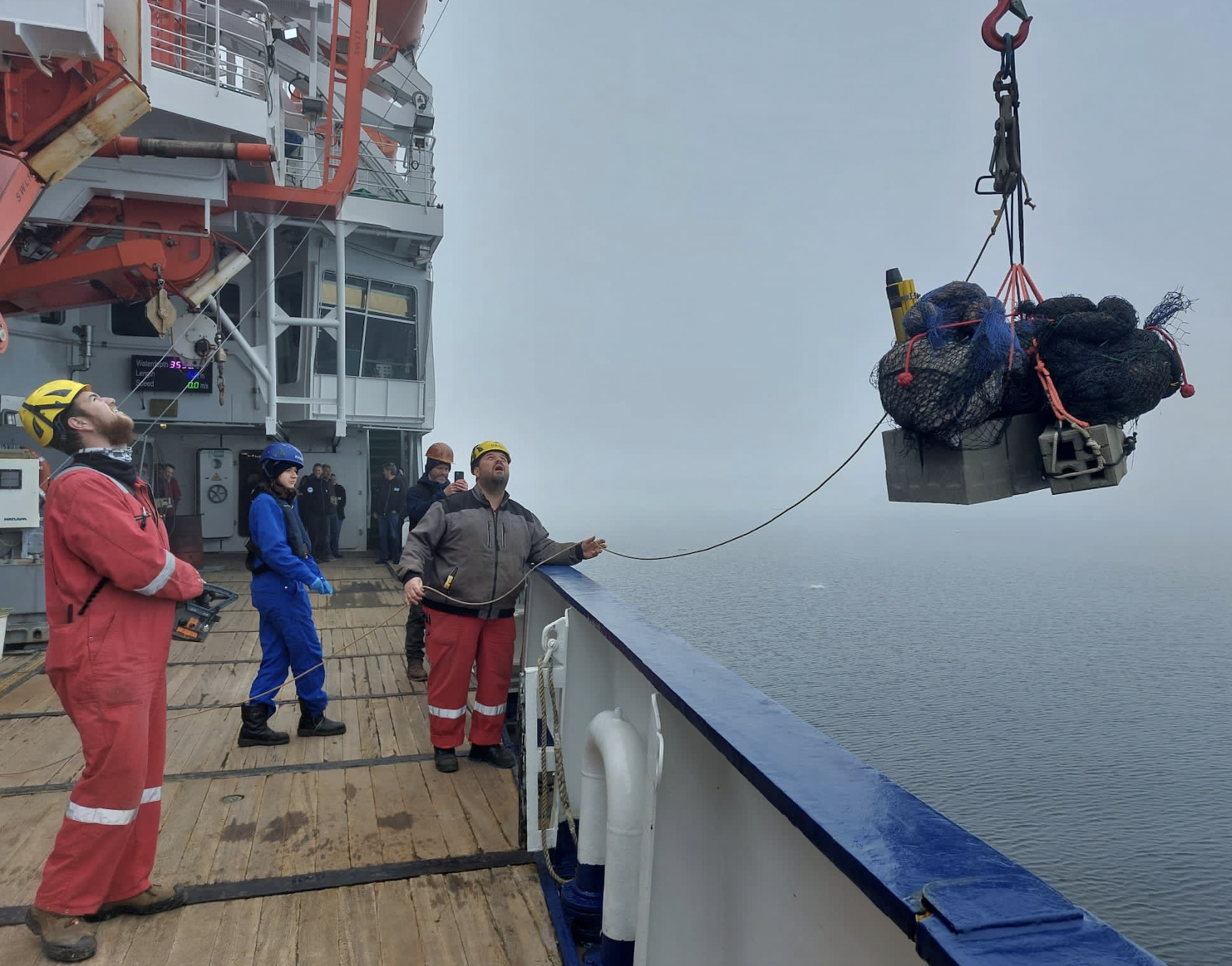Seafields – a carbon removal company based in the UK – has today, shared details of the world’s first seaweed biomass sinking trials for carbon removal to test the impact on the surrounding environment. This is the world’s first sinking test of its kind, and the first test to assess environmental impact.
 Antonia Thielecke (in blue)/Alfred Wegener Institute leading the operation on board the German icebreaker RV Polarstern. Image Credit: Gianluca Volpe.
Antonia Thielecke (in blue)/Alfred Wegener Institute leading the operation on board the German icebreaker RV Polarstern. Image Credit: Gianluca Volpe.
This trial is Seafields’ first step towards an environmental impact study and will assess four different types of biomass – unprocessed Sargassum, Ulva (green algae), kelp and terrestrial biomass. Sinking to the bottom of the sea floor, it’s anticipated that the bales of seaweed will be able to lock away carbon for millennia, helping to reduce atmospheric greenhouse gas concentrations in the future, whilst limiting the impact on the ocean floor to a minimum.
John Auckland, CEO of Seafields, said: “This is an incredibly exciting project for all involved and a big milestone in Seafields' monitoring, reporting, and verification (MRV) process. Three different types of seaweed are being explored together with terrestrial biomass for their effects on the deep-sea community because it's crucial that we prove our hypothesis that the bales have little impact on the life down there and have a slow degradation rate. Not many studies give us information about the decomposition of seaweed under natural conditions on the deep-sea floor, despite this knowledge being crucial. The hope is that the effect is minimal and that we can do this on a much larger scale one day at specially selected sites.”
Joining forces with Running Tide and the Alfred Wegener Institute, Helmholtz Centre for Polar and Marine Research (AWI), the team deposited the bales in June during an expedition to AWI’s LTER (Long-Term Ecological Research) Observatory HAUSGARTEN on the RV Polarstern at a depth of 3483 metres. The joint operation was made possible through the collaboration with Frank Wenzhöfer and the AWI's Deep-Sea Ecology and Technology team. Working with independent scientists is at the heart of Seafields' mission to ensure that all decisions in the various operations are based on scientific evidence.
Antonia Thielecke, Seafields’ Science Advisor and ocean biogeochemist and PhD candidate of Mar Fernández-Méndez, co-founder of Seafields, at the Alfred Wegener Institute said: “The Fram Strait location is a deep-sea area very well studied by scientists at the Alfred Wegner Institute. With nearly 25 years of knowledge of this deep-sea environment (e.g., existing bacteria, algae, and other organisms of the deep-sea community), we will know what results will be out-of-the-ordinary, or unlike results they’ve seen before – thus due to the effects of the bales.”
To study the processes on the deep-sea floor around the four biomass packages, Seafields will collaborate with the AWI and Running Tide to deploy a remotely operated vehicle at the deposition site from Polarstern during next year’s expedition to the long-term observatory in the Fram Strait.
“Together with our partners in this project – Running Tide and AWI – at around the same time next year, we hope to deploy an ROV (remotely operated vehicle) to take videos and images of the bales and the surrounding area at the deep sea to monitor progress and to bring samples back to the surface for further analysis. We are looking forward to seeing the data on oxygen consumption as well as the carbon content in the bales after a year, but getting this data and analysing it will take some time.” Auckland added.
With over two decades (since 1999) of studying this specific location in the Fram Strait, it provided the perfect location for Seafields to conduct the test. The team will return to the site next year to survey the area on and around the bales, and take sub-samples to study them in the laboratory. The samples will be analysed using various methods to investigate the carbon content and integrity of the biomass bales.
Franziska Elmer, Lead Scientist and Scientific Project Manager at Seafields, said: “Sargassum has been sinking naturally for thousands of years; it is an important part of the natural carbon flux to the deep sea. However, only a handful of studies have documented this, and none of them have investigated what positive and negative long-term impacts a Sargassum fall has on the deep-sea floor. The results of this study will be truly ground-breaking. The Environmental Impact Assessment will guide Seafields and others on whether sinking Sargassum is a safe way to sequester carbon.”